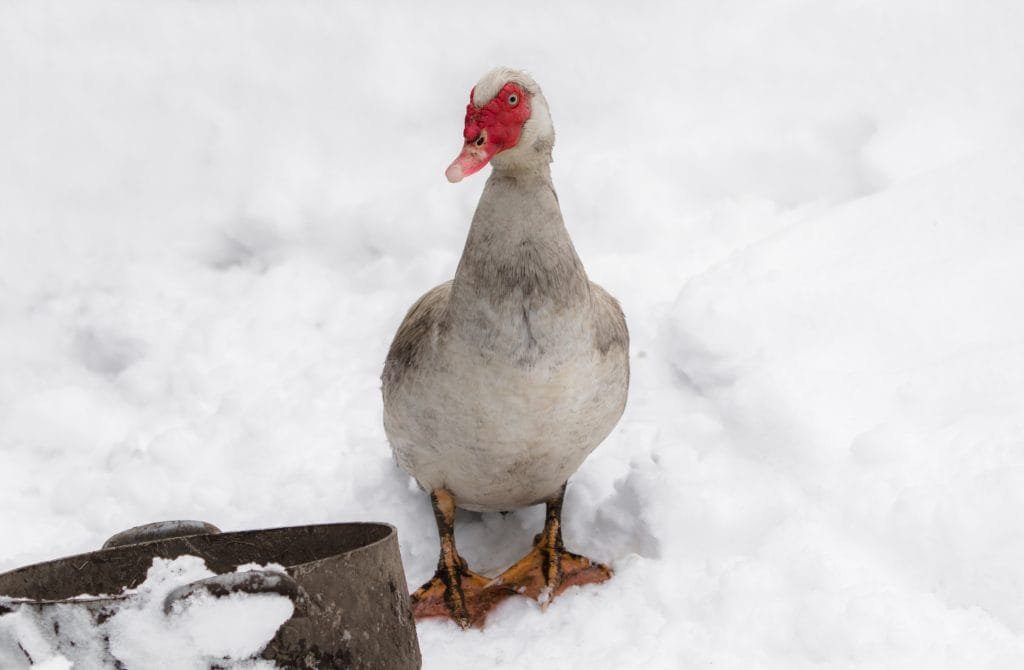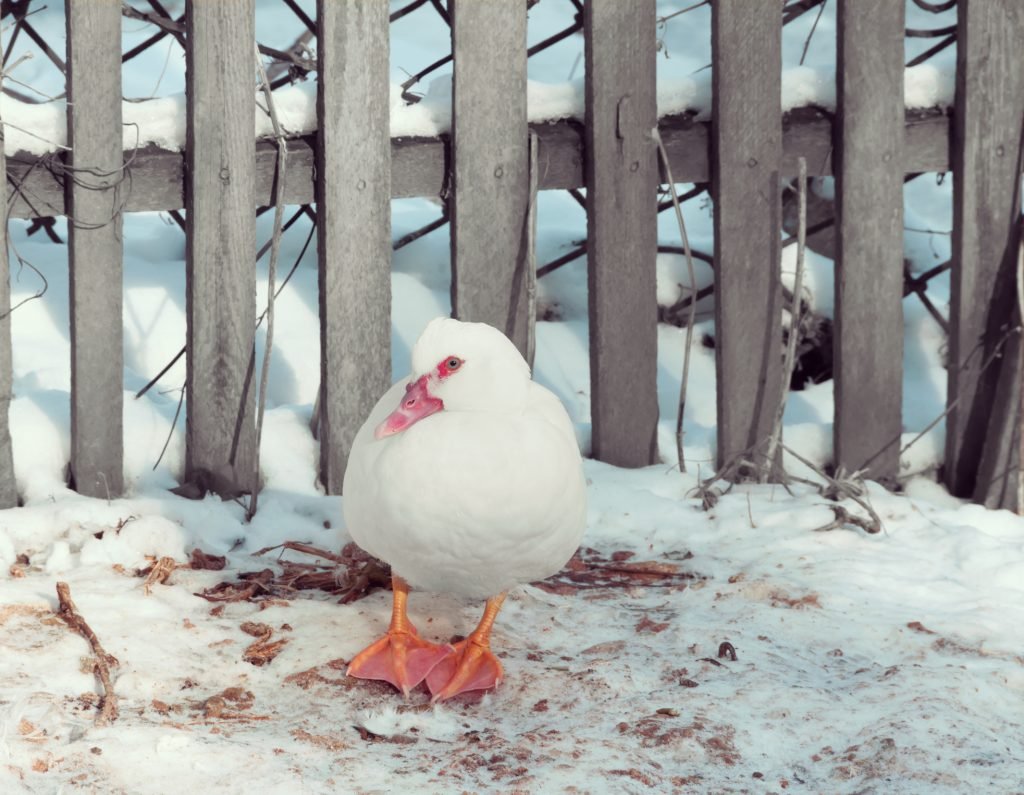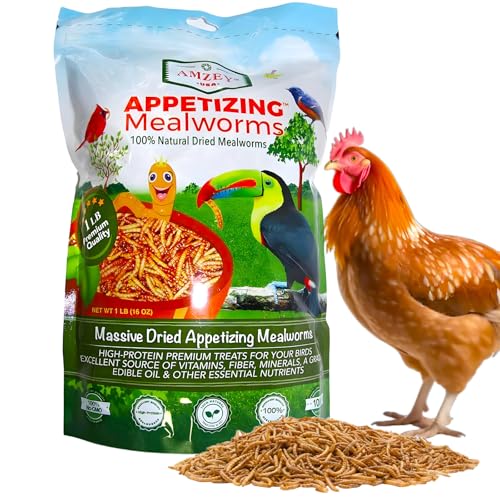This post contains affiliate links.
There are plenty of insects and grubs for ducks to eat when free-ranging in the summer, but many of these food sources are not available in the winter. Even if you provide food for your ducks, you may wonder if they need extra food in winter. Some people also like to assist wild ducks in the winter months. So, what should you feed ducks in the winter?
Ducks can be fed commercial duck feed with a minimum protein content of 18%. Supplemental feeding includes grains, seeds, greens, hay, legumes, earthworms, and mealworms. High protein and fat foods are important for winter feeding. Warm oatmeal can be used as emergency food for cold ducks.
Animals’ food needs change over the seasons, and it is wise to know how you should provide for your ducks in the cold days of winter.

What Food Do Ducks Need In Winter?
Pelleted commercial duck food is available at some co-ops, and some duck owners choose to feed these throughout the year. There are two kinds of commercial foods available: layer feeds and feeds for meat birds.
Some people use chicken layer pellets for ducks as they may not have access to duck pellets. Feeding chicken pellets is an acceptable practice, but it is essential to remember that ducks have a greater need for niacin (vitamin B3). You need to supplement the layer pellets with vitamin B3 powder, especially in winter.
Ducks need more calories in winter, which can be achieved by increasing the amount of feed or adding supplemental food rich in proteins and fats. You may also wonder how often you should feed your ducks, check out my article to learn more, How Often To Feed Ducks?
- 100% complete daily nutrition Purina Duck Feed Pellets are balanced and complete,...
- Research proven feed Purina has been conducting poultry research for nearly a century. We...
- Key nutrients to support growth and development 19% protein to get young birds off to a...
Should I Feed My Ducks Grain In Winter?
Grains take much longer to digest than pellets. During digestion, the body’s metabolism results in an increased body temperature. Giving ducks a grain treat late in the afternoon allows them to keep warmer at night while they digest the grain.
Grains suitable for ducks include:
- White and brown rice
- Wheat
- Barley
- Uncooked oats
- Corn
What Protein And Fats Can I Feed Ducks In Winter?
Ducks need a diet that contains a minimum of 18% protein. If you are feeding commercial feed, check the label to ensure the feed meets these nutritional requirements. In winter, the protein demands are higher. They can be supplemented by using a variety of foods.
Mealworms and earthworms are high in protein and fats and make an excellent choice of supplemental protein for ducks in winter. Ducks enjoy the activity of ‘catching’ the worms. Fat and protein also digest slowly, resulting in higher body temperatures for added warmth.
Peanuts, peas, or soy products contain protein and fat and are an excellent warming addition to feed for winter.
Worms, peanuts, peas, and soya can be fed to domesticated and wild ducks.
- HIGH IN PROTEIN: Dried mealworms are an essential source of proteins & nutrients for...
- BOOSTS IMMUNE SYSTEM & IMPROVES HEALTH : Our mealworms contain essential source of...
- 100% NATURAL: Non-GMO, preservative and additive-free. Have a piece of mind when feeding...
What Warming Food Can I Feed Ducks In Winter?
Sometimes your ducks may be chilled and struggling to warm up enough. Cracked corn, warm cooked or soaked oatmeal, and fermented feed are all good feeds to provide ducks when they need a heat boost.
Seeds are a rich source of fat and protein and can build heat in cold birds.
What Greens Should I Feed Ducks In Winter?
Ducks should have access to hay throughout the year, but this is vital during winter. Other greens such as kale, wheatgrass, lettuce, spinach, and herbs are beneficial and help provide added nutrients.
Vegetable peelings and offcuts can be chopped into small pieces and offered to ducks. Most ducks enjoy some fruit as a treat but ensure it is cut into appropriate sizes, and fruit such as grapes must be cut in half. Ducks cannot bite food or chew it, so food pieces must be small enough to avoid choking.

Should I Bulk Up My Ducks For Winter?
When setting your ducks up for winter, you must consider the climate where you live. Icy winters will be much more demanding on the ducks than temperate winters where the temperature drop is mild.
In areas with freezing winters, providing your ducks with extra food late in the fall so that they can build some fat stores is a good idea. The fat provides an insulating layer against the cold.
The added food will ensure that the duck has enough nutrients to have plumage that is in excellent condition to help protect the duck from frigid temperatures.
Why Do Ducks Need More Calories In Winter?
Keeping warm is an expensive business in terms of the energy required. In winter, ducks must utilize high amounts of energy to maintain a stable body temperature. The duck’s body will use available glucose from feed and supplement this by burning body fat as required.
Providing high-calorie food in winter means that the duck has less need to burn body fat which would deplete its resources. A duck with poor body condition at the end of winter will not be ready to reproduce in spring.
Can I Feed Ducks Bread In Winter?
Ducks should not be fed bread any time of the year. It provides an incorrect nutritional profile that can cause nutrient deficiencies, especially in ducklings. Uneaten bread attracts rodents and unwanted pests. It also grows mold which is harmful to the ducks if they eat it.
Although bread is made of wheat, which ducks can eat, bread is processed and refined. It loses all the qualities that make raw wheat an acceptable feed for ducks. It is rather like feeding your duck junk food.
Ducks Need Access To Water In Winter
It may seem like an obvious fact to state that ducks need water in winter, but some people assume the snow is enough and the ducks don’t need water. Ducks need water throughout the year to:
- Digest their food.
- Clean their sinuses. They do this by repeatedly dipping their heads in the water.
- Moisturize their eyes as they have no tear ducts.
In winter, it may be necessary to supply the ducks with a bowl of warmed water several times a day.
Final Thoughts
Ducks need additional nutrients to keep warm in winter. These can be provided by supplying the ducks with food high in protein and fats. Food that takes longer to digest will keep the body temperature elevated, carrying the duck through the long cold nights.


